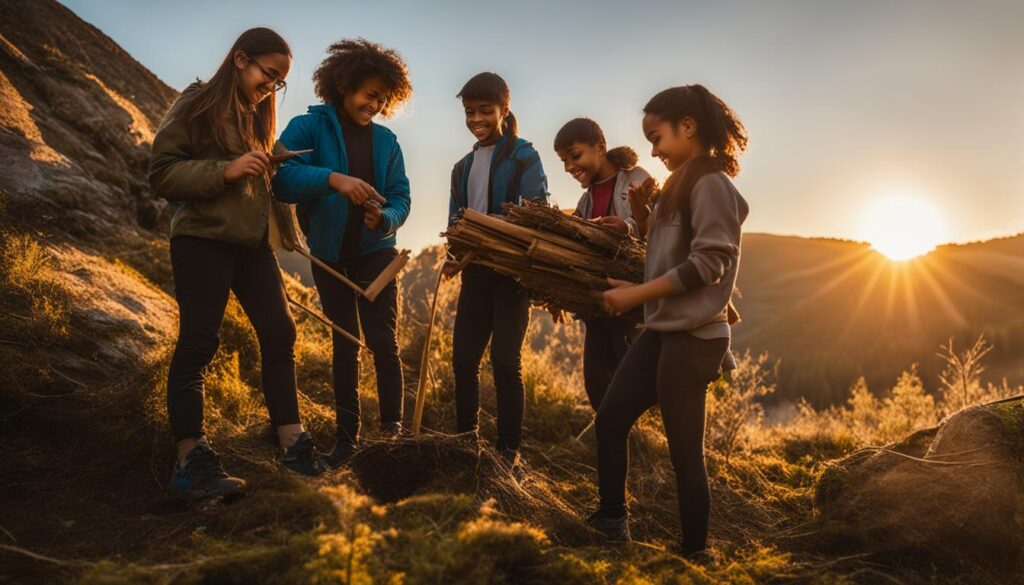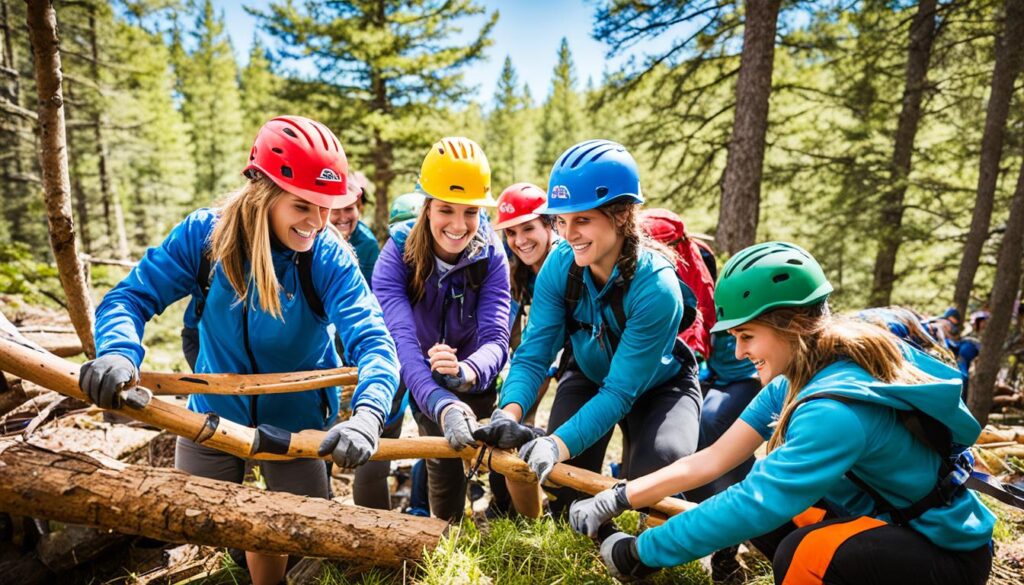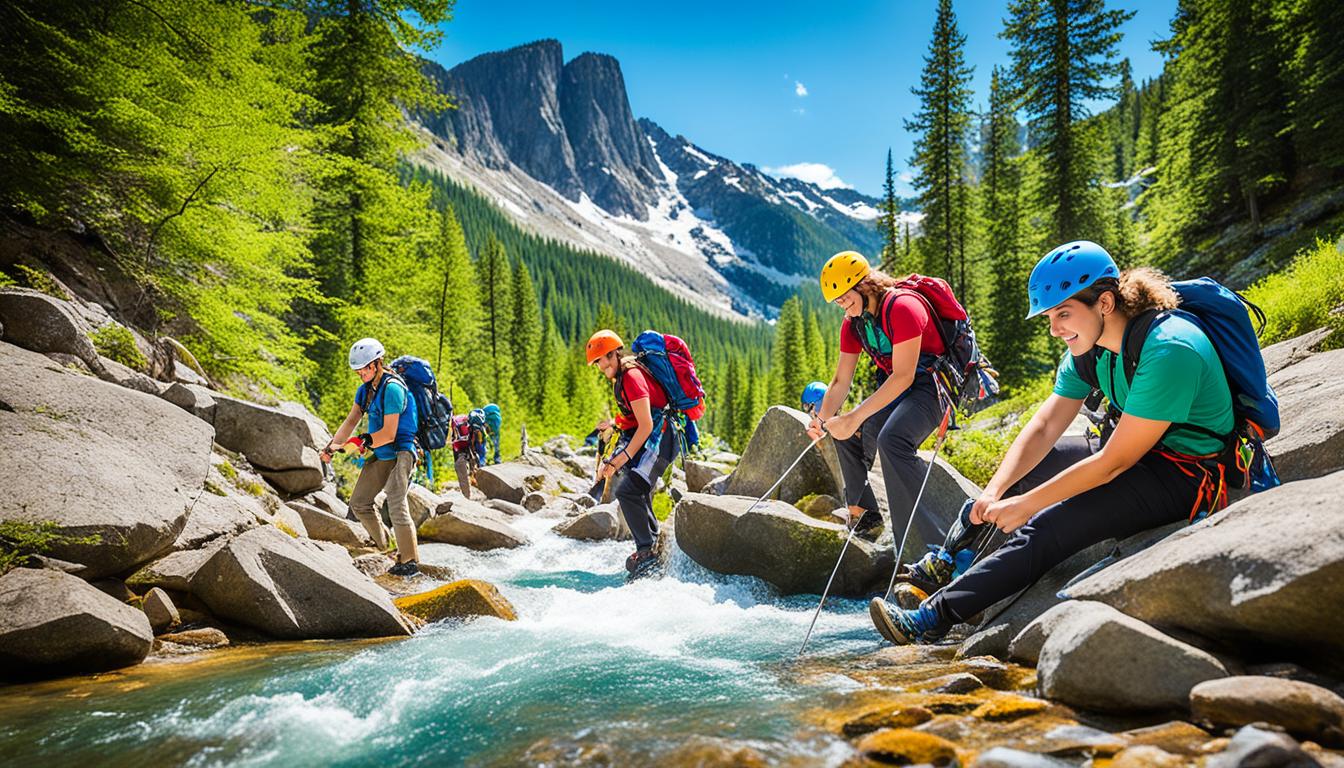Greetings, fellow educators and adventure enthusiasts! Today, we embark on an exciting journey that explores the power of outdoor learning adventures education in preparing students for the dynamic world that lies ahead. As the traditional methods of education fall short in equipping students with the skills and mindset needed for success, it has become crucial for us to embrace alternative approaches that foster creativity, critical thinking, problem-solving, social-emotional growth, and resilience.
Adventure-based education, with its emphasis on outdoor learning experiences, has emerged as a beacon of hope in this rapidly changing world. By immersing students in real-world scenarios and challenges, it provides a unique opportunity to prepare them for the complexities they will encounter in their future careers.
To kick-start this thrilling expedition, let’s delve into the significance of adventure education in shaping the minds of our students and molding them into future leaders who can confidently navigate a world that is ever-evolving and dynamic.
Key Takeaways:
- Outdoor learning adventures education offers an effective approach to preparing students for a dynamic world.
- Adventure-based education fosters creativity, critical thinking, problem-solving, social-emotional growth, and resilience.
- Outdoor learning experiences immerse students in real-world scenarios and challenges.
- Adventure education equips students with the skills and mindset needed to navigate the complexities of their future careers.
- By embracing adventure education, we can prepare students to thrive in a rapidly changing world.
Embracing a World in Flux: The Case for Outdoor Learning Adventures Education
In a world characterized by constant change and uncertainty, outdoor learning adventures education offers a compelling case for preparing students for the future. The importance of outdoor education is gaining recognition in educational settings as schools seek to equip students with the skills and experiences necessary to navigate the complexities of the modern world.
Outdoor learning experiences play a crucial role in fostering creativity, developing critical thinking skills, promoting social and emotional growth, and building resilience in students. By immersing students in outdoor environments, they are provided with unique opportunities to learn and grow in ways that traditional classroom settings cannot replicate.
Outdoor education encourages students to think creatively by challenging them with real-world problems and scenarios. It stimulates their critical thinking skills as they navigate through complex situations and make informed decisions. These experiences also promote social and emotional growth by allowing students to collaborate with their peers, develop empathy, and build strong interpersonal relationships.
Furthermore, outdoor learning adventures education helps students build resilience, an essential trait in the face of adversity and change. By overcoming physical and mental challenges in nature, students learn to persevere, adapt, and develop a growth mindset. They become more confident and self-reliant, ready to face the unpredictable future with confidence.
By embracing outdoor education, schools provide students with a holistic and well-rounded education that goes beyond academic knowledge. Outdoor learning adventures education cultivates lifelong skills, instilling in students a sense of wonder, curiosity, and an appreciation for the natural world. It prepares them to thrive in a world that demands adaptability, creativity, critical thinking, and resilience.
Next, we will explore the roots and relevance of experiential education in today’s society, shedding light on the renowned psychologist David Kolb’s experiential learning model and the transition from passive to active learning. Join us in section 3 as we delve deeper into these topics and their impact on education.
The Roots and Relevance of Experiential Education in Today’s Society
Experiential education has a rich history rooted in the pioneering work of renowned psychologist David Kolb. Kolb’s experiential learning model has revolutionized the way we approach education, emphasizing the importance of hands-on experiences and active engagement in the learning process.
Understanding Kolb’s Experiential Learning Model
Kolb’s experiential learning model is based on the idea that effective learning occurs through a cycle of concrete experience, reflection, abstract conceptualization, and active experimentation. Each stage of the cycle plays a crucial role in the learning process.
Concrete experience: This stage involves engaging in direct experiences that provide a basis for learning. It could be a real-world activity, an immersive simulation, or even role-play exercises. The goal is to create an experience that allows learners to directly interact with the subject matter.
Reflection: After the concrete experience, learners take time to reflect on what they have experienced. Reflection encourages critical thinking, analysis, and the exploration of personal insights. It helps learners make sense of their experiences and extract meaningful lessons.
Abstract conceptualization: In this stage, learners use their reflections to develop abstract concepts and theories. They make connections between their experiences and existing knowledge, exploring underlying principles and frameworks that can broaden their understanding of the subject matter.
Active experimentation: The final stage involves applying the concepts and theories developed in the previous stages. Learners actively engage with the newfound knowledge, experiment with different approaches, and refine their understanding through practical application. This stage encourages learners to test their theories, learn from their mistakes, and continuously improve.
By following this experiential learning model, educators can create a dynamic and interactive learning environment that promotes deeper understanding, critical thinking, and personal growth.
Transitioning from Passive to Active Learning
Traditional education often relies on passive learning methods, where students are passive recipients of information. Experiential education, on the other hand, emphasizes active learning, where students actively participate in the learning process, engage with the material, and apply their knowledge in meaningful ways.
Active learning in experiential education can take various forms, including field trips, simulations, hands-on experiments, group projects, and real-world problem-solving activities. These active learning experiences allow students to connect theory with practice, develop practical skills, and gain a deeper understanding of the subject matter.
Active learning not only enhances students’ retention of information but also fosters creativity, critical thinking, collaboration, and problem-solving skills. It promotes a learner-centered approach, where students become active contributors to their own education, taking ownership of their learning journey.
By transitioning from passive to active learning, educators can create an experiential education environment that empowers students to be lifelong learners, equipped with the skills and mindset to thrive in an ever-changing world.

Adventure Education Programs: Catalysts for Creative and Critical Thinking
Fostering Problem-Solving Skills through Outdoor Challenges
Adventure education programs provide students with unique opportunities to develop problem-solving skills through engaging in outdoor challenges. These programs create real-world scenarios that require students to think innovatively and come up with solutions. Whether it’s navigating an obstacle course, planning a hiking route, or collaborating on a team-building activity, adventure education programs push students out of their comfort zones and into situations where they must apply their problem-solving skills.
Outdoor challenges present students with complex problems that demand creative and critical thinking. They are encouraged to brainstorm ideas, analyze potential solutions, and evaluate their effectiveness. By actively engaging in problem-solving activities, students develop the ability to think outside the box, consider multiple perspectives, and adapt their approaches as necessary.
Through these challenges, students also learn the value of teamwork and collaboration. They discover that by working together, they can generate more innovative solutions and overcome obstacles more effectively. Adventure education programs foster a supportive and inclusive environment that encourages students to share their ideas, listen to others, and cooperate to achieve common goals.
Incorporating Reflective Practices in Adventure Learning
In addition to problem-solving skills, adventure education programs emphasize the importance of reflective practices. Reflective practices involve students reflecting on their experiences, analyzing their actions and decisions, and identifying areas for improvement. This process not only enhances students’ self-awareness but also encourages them to learn from their successes and failures.
Adventure education programs provide structured opportunities for reflection, such as group debriefing sessions or individual journaling activities. During these sessions, students are encouraged to reflect on the challenges they faced, the strategies they employed, and the outcomes they achieved. By reflecting on their experiences, students gain insights into their strengths and weaknesses, enabling them to refine their problem-solving approaches and enhance their learning.
Reflective practices in adventure learning also foster metacognitive skills, as students develop the ability to think about their thinking. They become more adept at identifying their own thinking patterns, assessing the effectiveness of their problem-solving strategies, and making adjustments based on their observations. This metacognitive awareness empowers students to become more autonomous learners, taking ownership of their learning and continually striving for improvement.
Adventure education programs provide a unique setting for nurturing students’ creative and critical thinking skills. Through outdoor challenges, students develop problem-solving abilities and learn to think innovatively. Reflective practices further enhance their learning by encouraging self-awareness and metacognitive skills. By incorporating adventure education programs in schools, educators can equip students with the skills necessary to thrive in a dynamic and ever-changing world.
Outdoor Education Activities: A Springboard for Social and Emotional Growth
Outdoor education activities provide a unique opportunity for students to develop their social and emotional skills while experiencing the wonders of nature. Through these activities, students can enhance their empathy, collaboration, and learn valuable lessons from their mistakes. Let’s take a closer look at how outdoor education activities foster social and emotional growth.
Developing Empathy and Collaboration in Natural Settings
When students engage in outdoor education activities, they have the chance to connect with nature and develop a deep sense of empathy. Immersed in natural environments, students witness the interdependence of all living things, fostering compassion and understanding towards both the environment and their fellow classmates. Working together to navigate challenges and solve problems, students also cultivate essential collaboration skills that are crucial for success in today’s interconnected world.
Learning from Mistakes: Embracing Failure as a Learning Tool
Outdoor education activities provide a safe space for students to make mistakes and learn from them. Whether it’s attempting a challenging hiking trail or working on a team-building exercise, students will inevitably encounter setbacks and obstacles. Embracing failure as a learning tool, students can reflect on their experiences, analyze what went wrong, and develop strategies to overcome difficulties. This process encourages resilience, problem-solving skills, and a growth mindset, equipping students with valuable life skills that extend far beyond the outdoor setting.

| Milestone | Benefits |
|---|---|
| Developing Empathy | – Foster care and respect for the environment – Enhance understanding of others |
| Promoting Collaboration | – Encourage teamwork and cooperation – Enhance communication skills |
| Learning from Mistakes | – Foster resilience and adaptability – Develop problem-solving skills |
Building Resilience and Adaptability with Nature-Based Education
Nature-based education plays a significant role in building resilience and adaptability in students. By immersing students in outdoor environments, they are exposed to real-world challenges and develop essential skills to navigate through them.
The Significance of Outdoor Skills Development
Outdoor skills development is a crucial component of nature-based education. It equips students with practical skills that are essential for survival and thriving in outdoor settings. From learning basic navigation techniques to acquiring wilderness first aid knowledge, outdoor skills empower students with invaluable tools for resilience and adaptability.
“Outdoor skills development allows students to develop a deeper connection with nature while building practical knowledge and self-confidence.”
Through hands-on learning experiences, students not only gain proficiency in outdoor skills but also develop problem-solving abilities and critical thinking. They learn to adapt to the ever-changing natural environment, anticipate challenges, and find creative solutions.
Creating Resilient Learners through Environmental Challenges
Environmental challenges presented in nature-based education programs provide students with opportunities to develop resilience. Whether it’s conquering a high ropes course or navigating a challenging hiking trail, students are tested both physically and mentally. These experiences build resilience by teaching students to persist through obstacles, overcome fear, and embrace failure as a stepping stone to growth.
“Experiencing and overcoming environmental challenges allows students to develop resilience, adaptability, and a growth mindset.”

Moreover, environmental challenges foster adaptability in students. By exposing students to diverse ecosystems and unpredictable natural conditions, nature-based education encourages them to be flexible and adaptable to different situations. They learn to adjust their strategies, adapt to varying environmental factors, and embrace change, which are essential skills for success in an ever-evolving world.
Incorporating nature-based education into school curricula not only cultivates skills but also nurtures a deeper connection with the environment. Students develop a sense of stewardship toward nature and a responsibility to protect and preserve the planet for future generations.
Benefits of Nature-Based Education
| Benefits | Description |
|---|---|
| Resilience | Develops the ability to cope with challenges and adversity |
| Adaptability | Fosters the capacity to adjust to changing circumstances |
| Problem-solving | Cultivates critical thinking and innovative problem-solving skills |
| Self-confidence | Builds self-esteem and belief in one’s abilities |
| Connection with nature | Nurtures a sense of environmental stewardship and appreciation for the natural world |
By incorporating nature-based education and outdoor skills development into academic programs, educators can prepare students to face the challenges of an ever-changing world. The skills and mindset developed through nature-based education empower students to be resilient, adaptable, and environmentally conscious individuals. Through these experiences, students become better equipped to navigate the complexities of their futures.
International Perspectives on Outdoor Education Curriculum
Outdoor education is a global phenomenon that is embraced by countries around the world. Each country brings its unique perspectives and approaches to outdoor education curriculum, incorporating diverse strategies and philosophies. From incorporating adventure learning experiences to promoting learning outside the classroom, outdoor education plays a crucial role in shaping the educational landscape internationally.
Global Case Studies in Adventure Education
Adventure education programs have gained recognition for their effectiveness in fostering holistic development in students. Let’s take a closer look at some global case studies that highlight the impact of adventure education:
“Wilderness Leadership School” in South Africa focuses on leadership development and conservation education through multi-day wilderness programs. Students engage in various outdoor activities, such as hiking, canoeing, and team-building exercises, that promote personal growth and environmental stewardship.
In Canada, “Outward Bound” offers experiential learning programs that provide students with transformative experiences in natural settings. Through outdoor challenges, students develop problem-solving skills, resilience, and self-confidence.
“Duke of Edinburgh’s International Award” is a renowned adventure education program implemented in countries worldwide, including the United Kingdom, Australia, and India. It offers young people the opportunity to engage in outdoor activities, community service, and skill development, fostering personal growth and global citizenship.
Learning Outside the Classroom – A European Outlook
Europe has long recognized the value of learning beyond the classroom walls, incorporating outdoor education into formal education systems. With a focus on experiential learning and practical skills development, European countries offer students unique opportunities to connect with nature and their communities.
Integrating Outdoor Experiential Learning in Academic Programs
Integrating outdoor experiential learning into academic programs offers a unique approach to enhance students’ learning experiences. By stepping out of the traditional classroom setting, students have the opportunity to engage with nature, explore real-world concepts, and develop a deeper understanding of the subjects they are studying. Outdoor experiential learning allows students to apply their knowledge in practical scenarios, fostering a sense of authenticity and relevance.
Outdoor Education Workshops and In-Service Teacher Training
Outdoor education workshops and in-service teacher training are essential for equipping educators with the necessary knowledge and skills to incorporate outdoor learning into their teaching practices. These workshops provide educators with practical strategies, resources, and best practices for implementing outdoor experiential learning in academic programs. They offer opportunities for professional development, collaboration, and the exchange of ideas, creating a supportive community of educators dedicated to outdoor education.
Cultivating a Culture of Authentic Learning in Landscapes
Cultivating a culture of authentic learning in landscapes involves creating an environment where students can immerse themselves in real-world experiences that align with their academic curriculum. By connecting classroom learning with hands-on activities in natural settings, students are able to see the practical applications of what they are learning, deepening their understanding and fostering a greater appreciation for the subject matter. Authentic learning experiences also encourage curiosity, creativity, and critical thinking skills, as students are challenged to solve real-world problems.
Environmental Education: Preparing for Tomorrow’s Ecological Challenges
Environmental education has become imperative in preparing students to tackle the ecological challenges that lie ahead. By equipping them with knowledge and instilling a sense of responsibility towards the environment, we empower them to become stewards of our planet.
Promoting Environmental Stewardship amongst Youth
One of the key aims of environmental education is to promote environmental stewardship amongst young people. By fostering an understanding of the interconnectedness of ecosystems and the impact of human activities on the environment, we can inspire them to take action and make sustainable choices. Through education, we encourage them to become responsible global citizens and contribute towards creating a greener and more sustainable future.
Connecting with Nature to Address Global Environmental Issues
A crucial aspect of environmental education is connecting students with nature. By immersing them in outdoor environments, we provide them with opportunities to develop a deeper appreciation for the natural world and understand the importance of its conservation. This connection with nature also enables students to address global environmental issues. When they experience firsthand the beauty and vulnerability of our planet, they become motivated to take proactive measures to protect it.
| Environmental Education Benefits | Impact |
|---|---|
| Promotes environmental stewardship | Empowers students to become responsible global citizens |
| Connects students with nature | Fosters a sense of environmental responsibility and motivates action |
| Raises awareness about global environmental issues | Encourages students to make sustainable choices and work towards solutions |
Integrating environmental education into the curriculum is essential in preparing students to address ecological challenges proactively. By nurturing environmental stewardship and fostering a strong connection with nature, we can empower the next generation to play an active role in preserving and protecting our planet.
Conclusion
In conclusion, outdoor learning adventures education provides a powerful and effective approach to preparing students for the dynamic world they will enter. By incorporating outdoor education into their curriculum, schools can nurture creativity, critical thinking, problem-solving skills, social and emotional growth, resilience, and environmental stewardship in students. Through experiential and nature-based learning, students can develop the skills and mindset necessary to navigate the challenges of the modern world.
It is crucial for educators and stakeholders in the education system to recognize the value of outdoor education and actively integrate it into their educational practices. By doing so, we can ensure that students are well-prepared to thrive in a rapidly changing and dynamic world. Outdoor learning adventures education equips students with the skills and experiences that traditional rote learning methods may not provide, empowering them to think innovatively, work collaboratively, and adapt to new situations.
As we look towards the future, it is clear that outdoor education plays an essential role in preparing students for the complexities of the modern world. By embracing outdoor learning adventures education, we can equip students with the tools they need to succeed and make a positive impact in their personal and professional lives. Let us continue to prioritize outdoor education, recognizing its significance in shaping the next generation of thinkers, leaders, and problem-solvers.
FAQ
What is adventure-based education?
Adventure-based education is an approach to education that incorporates outdoor learning experiences to foster creativity, critical thinking, problem-solving, social-emotional growth, and resilience in students.
Why is outdoor education gaining importance in educational settings?
Outdoor education is gaining importance because it offers unique benefits such as fostering creativity, developing critical thinking skills, promoting social and emotional growth, and building resilience in students.
What is experiential education?
Experiential education is a learning approach that actively engages students in the learning process through hands-on experiences. It enhances learning by emphasizing reflection, experimentation, and real-world application of knowledge.
How does adventure education foster problem-solving skills?
Adventure education programs create real-world scenarios that require students to think innovatively and come up with solutions. By engaging in outdoor challenges and activities, students can develop problem-solving skills through experiential learning.
How do outdoor education activities promote social and emotional growth?
Outdoor settings provide opportunities for developing empathy and collaboration through connections with nature and engaging in group activities. Participating in outdoor education activities also helps students learn from their mistakes and develop resilience.
How does nature-based education build resilience in students?
Nature-based education, through outdoor skills development and environmental challenges, helps students navigate obstacles and adapt to new situations. By embracing nature, students can develop resilience and thrive in a rapidly changing world.
What are some international perspectives on outdoor education curriculum?
There are various approaches to outdoor education curriculum around the world. Case studies of adventure education programs and European initiatives on learning outside the classroom showcase the global significance of outdoor education.
How can outdoor experiential learning be integrated into academic programs?
Outdoor education workshops and in-service teacher training can equip educators with the knowledge and skills to incorporate outdoor learning into their teaching practices. By cultivating a culture of authentic learning in landscapes, students can engage with nature and deepen their understanding of subjects.
Why is environmental education important?
Environmental education promotes environmental stewardship among youth, empowering them to become responsible global citizens. By connecting with nature and addressing global environmental issues, students develop a sense of environmental responsibility and motivation to make positive changes.
Source Links
- https://www.easchooltours.com/blog/experiential-learning-learn-through-experience
- https://link.springer.com/chapter/10.1007/978-3-031-04108-2_12
- http://www.docs.hss.ed.ac.uk/education/outdoored/oe_authentic_learning.pdf

